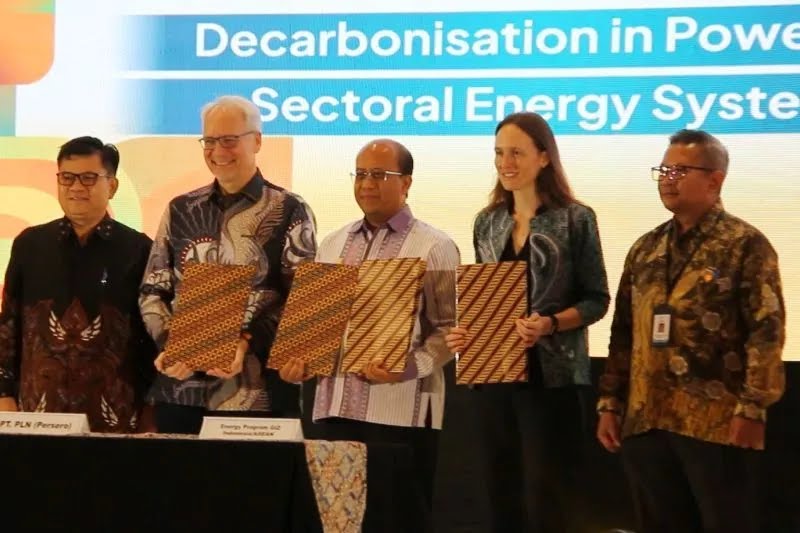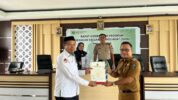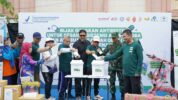Germany and Indonesia Enhance Renewable Energy Partnership with New MoU
JAKARTA, RAKYAT NEWS- During the Indonesia Sustainable Energy Week (ISEW) 2024, a significant milestone was reached in Indonesia’s collaboration with Germany in the energy sector.
The Indonesian power giant PT PLN signed an updated memorandum of understanding (MoU) along with two grant agreements with German partners GIZ and KfW, marking a renewed commitment to renewable energy development.
GIZ: Deutsche Gesellschaft für Internationale Zusammenarbeit, is a German development agency that provides services in the field of international cooperation for sustainable development. It focuses on areas such as economic development, environmental protection, and social development, working with both governmental and non-governmental organizations.
KfW: Kreditanstalt für Wiederaufbau, is a German development bank that provides financial services to support development projects, including renewable energy initiatives, infrastructure projects, and economic development programs. It plays a significant role in financing projects aimed at fostering economic growth and sustainable development.
This collaboration, which has been ongoing for over four decades, continues to evolve, focusing on ambitious renewable energy targets within Indonesia’s electricity sector. Since deepening their partnership in 2016, Indonesia and Germany have worked together through GIZ, KfW, and PLN on numerous initiatives aimed at supporting the country’s energy transition.
The cooperation includes financing renewable energy projects, developing transmission and distribution networks, and enhancing technical capacity and training for PLN staff. “This partnership is invaluable to PLN, supporting our efforts to accelerate the energy transition and decarbonize the electricity system. With this collaboration, we are confident that Indonesia can achieve its renewable energy targets while ensuring a reliable and affordable electricity supply,” said Suroso Isnandar, Director of Risk Management at PLN.
Lisa Tinschert, Director of Energy Programs at GIZ Indonesia/ASEAN, expressed pride in the collaboration, emphasizing that energy transition is crucial for achieving global climate targets and ensuring sustainable energy supplies. “We are committed to accelerating the integration of renewable energy into Indonesia’s power system and supporting projects that provide long-term benefits to Indonesian communities,” she added.
Burkhard Hinz, Director of KfW in Indonesia, highlighted KfW’s longstanding support for Indonesia’s energy sector. “KfW remains dedicated to assisting PLN and the Indonesian government in decarbonizing and modernizing the energy sector, contributing to the Just Energy Transition Partnership (JETP) targets agreed upon with the International Partner Group,” Hinz noted.
The technical collaboration between PLN and GIZ has led to significant achievements, such as the techno-economic study for electricity planning in Selayar, which supported the development of the Hybrid Solar Power Plant (PLTS) in Selayar, operational since 2022. This project has saved operational costs amounting to 16.5 billion rupiah annually and has trained over 350 PLN staff in environmentally friendly electricity system operations.
Looking forward, KfW and PLN are committed to further enhancing their clean energy collaboration through financial support, studies, and capacity development programs like the Energy Transition Acceleration Program and Just Energy Transition Partnership. The updated MoU between GIZ and PLN for the next five years underscores the ongoing commitment to sustainable clean energy development in Indonesia.
The event was attended by key figures including Jisman P. Hutajulu, Director General of Electricity at the Ministry of Energy and Mineral Resources, and Taufiq Hidayat Putra, Director of Electricity, Telecommunications, and Informatics at Bappenas, who emphasized the importance of this collaboration for achieving a cleaner and more sustainable energy future for Indonesia.
The second day of the event also featured discussions on energy management in industrial and building sectors, highlighting the importance of energy efficiency in the face of regulatory changes and enhancing industrial competitiveness. This celebration marks 30 years of energy cooperation between Indonesia and Germany, reinforcing both countries’ commitment to renewable energy targets and global decarbonization efforts. (Uki Ruknuddin)



























Tinggalkan Balasan